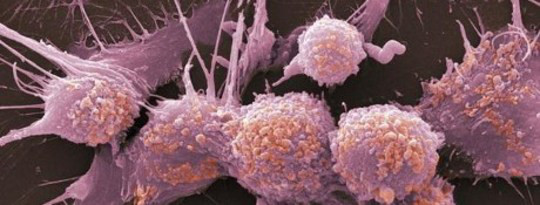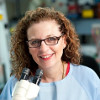
Can you imagine being so desperate for food that you would eat yourself to survive? Most people can’t but our cells do exactly this.
When cells are deprived of energy and nutrients from their external environment, they look internally, packaging up and consuming their own components to survive until an energy source becomes available. Once a food or nutrient source is available, cells are able to replace these components.
This cellular process is called autophagy, from “auto-” the Greek word for self and “phagein” meaning to eat. And cancer cells take advantage of this survival mechanism to evade some anti-cancer therapies.
Autophagy has remained largely unchanged across species throughout evolution occurring in organisms from yeast (simple cells) to eukaryotic (complex cells, like ours) systems in response to stressful conditions.
Get The Latest By Email
As we learn more about this process, we are garnering an understanding of how cancer cells survive therapy (from radiation to chemotherapy and novel targeted therapies) by digesting and recycling their own components to synthesise essential nutrients and provide energy.
Cancer Hungry For Energy
Cancer cells require a lot of energy to grow, make new cells and spread. They achieve this by harnessing survival processes used by normal, non-malignant cells.
Ordinarily, these survival processes are controlled by external factors, such as access to blood supply or growth signalling molecules from nearby cells. As these processes determine the life and death of non-malignant cells, they are highly regulated.
Importantly, in cancer cells these survival processes are independent of normal control mechanisms and therefore drive the uncontrolled growth and spread of the cancer.
In cancers such as chronic myeloid leukemia where we know what drives the disease (a mutant gene, referred to as the oncogene, which tells the cells to multiply and progress), therapies target cancer cells while leaving non-malignant cells alone.
This targeted approach has also been utilized in other cancers in which the driver of disease is known, resulting in more personalized anti-cancer therapies with fewer side effects.
Such targeted treatments essentially starve cancer cells by blocking their survival processes. This causes their death and results in remission for most patients.
Cancer’s Self-Cannibalizing Survival
 Resistance to therapy is an obstacle faced by both historic and current cancer therapies. One of the biggest challenges we now face in the development of new cancer treatments is persistent, low-level disease. While some new treatments control cancer very well, cure is yet to be proven in many settings.
Resistance to therapy is an obstacle faced by both historic and current cancer therapies. One of the biggest challenges we now face in the development of new cancer treatments is persistent, low-level disease. While some new treatments control cancer very well, cure is yet to be proven in many settings.
Work from our group recently demonstrated that when we use targeted therapy to attack cancer’s survival processes, such as signals to trigger cell growth, cancerous cells start to package up and consume their own contents.
Eating their own components allows them to generate the energy required to survive therapy. This results in persistent disease, or relapse.
Eating Itself To Death
Increasing evidence indicates that autophagy is a resistance mechanism used by several cancers, including, but not limited to, ovarian, pancreatic, brain, colon and breast cancers. But if this is a survival mechanism on which several cancers converge, can we use our understanding of autophagy against cancer cells?
And the answer is yes, because of the vast and ever-increasing knowledge base about autophagy, we now know how to block it.
In a stroke of luck, we’ve even found a common drug used for other conditions that blocks autophagy. It does this by preventing the breakdown of cellular components.
When autophagy blockers are used in combination with targeted treatment in the leukemia cells, the cells start to eat themselves, but are prevented from using what they consume for energy.
Approaches targeting autophagy are now being taken into clinical trials in combination with anti-cancer therapy for leukemia and other cancers.
Cancer is responsible for over eight million deaths worldwide every year (out of 46 million diagnoses). By investigating how cancer cells avoid being killed when patients are on therapy, we can more effectively treat cancers by “eating” cancer at its own game. And that’s exactly what we’re doing.
This article was originally published on The Conversation.
Read the original article.
About The Authors
 Deb White is Director of Cancer Research. CANCER THEME at South Australian Health & Medical Research Institute. Professor Deborah White provides strategic leadership and direction to the Leukaemia Research Group and leads the project teams as Scientific Head. Prof. White has worked in Haematology at SA Pathology for more than 30 years in various part- and full-time capacities, and her qualifications include a PhD in Medicine, and FFSc (RCPA). Deb White receives funding from Novartis and BMS. Also from the NHMRC, LFA and Beat Cancer (Cancer Council SA).
Deb White is Director of Cancer Research. CANCER THEME at South Australian Health & Medical Research Institute. Professor Deborah White provides strategic leadership and direction to the Leukaemia Research Group and leads the project teams as Scientific Head. Prof. White has worked in Haematology at SA Pathology for more than 30 years in various part- and full-time capacities, and her qualifications include a PhD in Medicine, and FFSc (RCPA). Deb White receives funding from Novartis and BMS. Also from the NHMRC, LFA and Beat Cancer (Cancer Council SA).
 Lisa Schafranek is a Post-Doctoral Researcher at South Australian Health & Medical Research Institute. She is a cancer biologist and just completed a PhD in Medicine. Specific focus on Chronic Myeloid Leukaemia and mechanisms of resistance to therapy. Lisa Schafranek receives PhD funding from the Leukaemia Foundation of Australia.
Lisa Schafranek is a Post-Doctoral Researcher at South Australian Health & Medical Research Institute. She is a cancer biologist and just completed a PhD in Medicine. Specific focus on Chronic Myeloid Leukaemia and mechanisms of resistance to therapy. Lisa Schafranek receives PhD funding from the Leukaemia Foundation of Australia.
You might want to read:
All Shook Up: My Natural Fight Against Cancer (with a little help from Elvis)
by Suzie Derrett, as told to Juliet Sullivan.
 All Shook Up is a book about one woman's determination and courage... to take on cancer, and win. It will make you laugh, it will make you cry, and above all, Suzie hopes, it will make you believe. The book is about how she was diagnosed with breast cancer aged 52, and uterine cancer aged 60. And how she then went on to beat the disease both times, not with any conventional treatments but solely with alternative therapies, humour, and Elvis.
All Shook Up is a book about one woman's determination and courage... to take on cancer, and win. It will make you laugh, it will make you cry, and above all, Suzie hopes, it will make you believe. The book is about how she was diagnosed with breast cancer aged 52, and uterine cancer aged 60. And how she then went on to beat the disease both times, not with any conventional treatments but solely with alternative therapies, humour, and Elvis.
Click here for more info and/or to order this book on Amazon.







